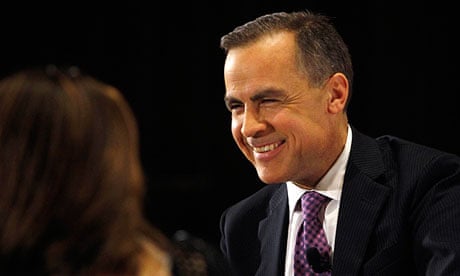Mark Carney warned on Thursday that he would be moving to a "crisis" economy when he takes over as governor of the Bank of England later this year.
Speaking in Washington, the current governor of the Bank of Canada bracketed the UK with the group of weak countries still trying to emerge from the downturn of the past four years. Carney sought to downplay expectations that he could single-handedly transform Britain's prospects, warning that central banks could only do so much and that healthy public finances and structural reform were needed to secure long-term growth.
The successor to Sir Mervyn King said there were three classes of countries in the global economy: crisis economies, those emerging from the crisis, and those growing strongly.
"The US is breaking out of the pack of crisis countries that includes the euro area, the UK and Japan," he said. Carney said central banks could help to stabilise economies through the use of interest rates and other less conventional tools, but said monetary policy was no panacea. He was speaking at an event organised by Reuters in which he sought to avoid talking about his new job.
George Osborne has agreed to pay Carney an £800,000-a-year package in the hope that he can find a way of boosting the UK's growth performance. The Bank's governor-elect said he would have to work with the other members of Threadneedle Street's monetary and financial policy committees.
"Some people may be expecting central banks to do too much," he said. "If we want to talk about ultimate sources of growth, sustainable fiscal policy is a necessary condition.
"Sustainable growth comes from the private sector, not from the IMF, Bank of Canada or anyone else."
Carney heaped praise on the US Federal Reserve for its policy of providing guidance to the financial markets on the future course of interest rates – an indication that he may favour the same approach for the UK. The Fed has told Wall Street that it will not increase borrowing costs until unemployment falls below 6.5% unless there is a sharp rise in inflation.
This approach, Carney said, had helped markets as they began to think about the winding-down of the massive stimulus provided by central banks since 2008. "I think the value of the Fed's ... guidance helps a lot with this," he said. "It helps market participants understand not exactly the timing of adjustment of interest rates but the minimum conditions before the Fed even thinks about adjustment of interest rates."
Osborne has told the Bank of England to report back to him in August on the merits of the steps taken by the US central bank and has asked what indicators might work in Britain.
King has opposed the idea of explicit guidance about the future direction of monetary policy, and warned of its potential dangers when he spoke at a seminar in Washington on Tuesday.
Asked whether the bailout of Cyprus represented a good precedent, Carney gave a cautious approval to the "bail-in" concept that has seen Cypriot bank accounts tapped for rescue funds. He said: "Not bail-in as it was performed a couple of weeks ago in Cyprus, but bail-in as a component of addressing systemic risk ... is an absolutely necessary element."
Meanwhile, the Commons Treasury committee gave its blessing to Carney's appointment in a report published on Friday. Andrew Tyrie MP, the committee chairman, said: "The Bank of England has taken on a wide range of new powers. Significant structural and cultural change is under way. Dr Carney will be responsible for overseeing it.
"In evidence to the committee, Dr Carney set out his preference for a consensus-based approach to leadership; this will be significant if it leads to a meaningful change of culture within the Bank. The committee wishes Dr Carney every success for his term as governor. He will bring a wide range of skills and a great deal of experience to the role."










